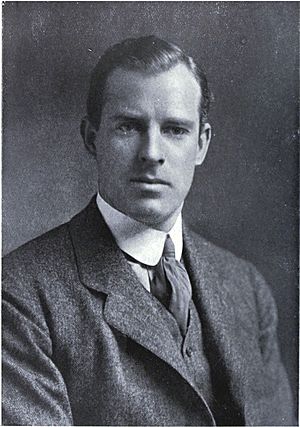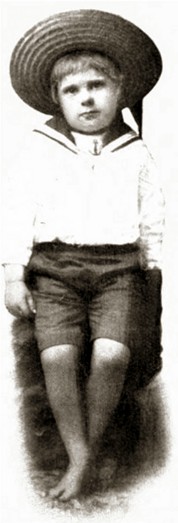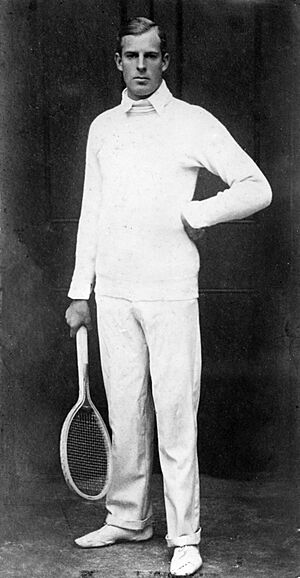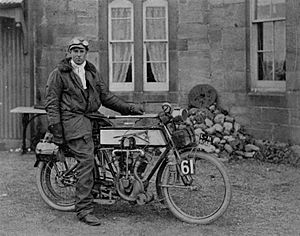Anthony Wilding facts for kids

Anthony Wilding, c. 1912
|
||||||||||||||
| Full name | Anthony Frederick Wilding | |||||||||||||
|---|---|---|---|---|---|---|---|---|---|---|---|---|---|---|
| Country (sports) | New Zealand | |||||||||||||
| Born | 31 October 1883 Christchurch, Canterbury, New Zealand |
|||||||||||||
| Died | 9 May 1915 (aged 31) Aubers Ridge, Neuve-Chapelle, France |
|||||||||||||
| Height | 1.87 m (6 ft 2 in) | |||||||||||||
| Plays | Right-handed (one-handed backhand) | |||||||||||||
| Int. Tennis HoF | 1978 (member page) | |||||||||||||
| Singles | ||||||||||||||
| Career record | 636–57 (91.7%) | |||||||||||||
| Career titles | 123 | |||||||||||||
| Highest ranking | No. 1 (1911, ITHF) | |||||||||||||
| Grand Slam singles results | ||||||||||||||
| Australian Open | W (1906, 1909) | |||||||||||||
| Wimbledon | W (1910, 1911, 1912, 1913) | |||||||||||||
| Other tournaments | ||||||||||||||
| WHCC | W (1913, 1914) | |||||||||||||
| WCCC | W (1913) | |||||||||||||
| Doubles | ||||||||||||||
| Grand Slam doubles results | ||||||||||||||
| Australian Open | W (1906) | |||||||||||||
| Wimbledon | W (1907, 1908, 1910, 1914) | |||||||||||||
| Grand Slam mixed doubles results | ||||||||||||||
| Wimbledon | F (1914) | |||||||||||||
| Team competitions | ||||||||||||||
| Davis Cup | W (1907, 1908, 1909, 1914) | |||||||||||||
|
Medal record
|
||||||||||||||
Anthony Frederick Wilding (born 31 October 1883 – died 9 May 1915), also known as Tony Wilding, was a famous New Zealand tennis player. He was considered the world's best tennis player at one point. Sadly, he died while serving as a soldier in World War I.
Wilding was born to a wealthy family in Christchurch, New Zealand. They had private tennis courts at their home. He studied law at Trinity College, Cambridge in England. Besides tennis, Wilding was also a first-class cricket player and loved motorcycles. He started his tennis career young, winning the Canterbury Championships at age 17. From 1909 to 1914, he became one of the top tennis players in the world.
He won 11 major tennis titles, including six in singles and five in doubles. He is the only player from New Zealand to win a Grand Slam singles title. Wilding also won seven ILTF World Championships. This included Wimbledon four times, the World Hard Court Championships twice, and the World Covered Court Championships once.
Wilding helped the Australasia team win the Davis Cup four times. He also won a bronze medal in tennis at the 1912 Summer Olympics. This made him the first and only New Zealander to win an Olympic tennis medal. He still holds several tennis records, like winning 23 titles in one year (1906). He also has 114 career outdoor titles, shared with Rod Laver. In 1978, Wilding was added to the International Tennis Hall of Fame.
Anthony Wilding: Tennis Legend and Soldier
Early Life and First Steps in Tennis
Anthony Wilding was the second of five children. His parents, Frederick and Julia, moved to New Zealand from England in 1879. His father was a successful lawyer and also a tennis player. He won several New Zealand doubles championships.
The family lived on a farm near the Heathcote River. They had two tennis courts: one for winter and one for summer. Anthony started playing tennis in 1889, when he was six years old. He got his first racquet from the company Slazenger.
He went to a private school where he was captain of the football team at age 12. In 1902, he traveled to England to study law at Trinity College, Cambridge. There, he improved his tennis skills as part of the university's tennis club. He even became the club's secretary and made tennis more popular. After finishing his studies, he returned to New Zealand to work with his father.
Rising to Tennis Stardom
First Tournaments and Wimbledon Debut
In October 1901, at 17, Wilding won his first singles title. This was at the Canterbury Championships in New Zealand. In 1903, he played in his first English tournament. He reached the semifinal, showing his talent early on. He also won a mixed doubles title with Wimbledon champion Dorothea Douglass.
Wilding worked hard to improve his backhand tennis shot. In June 1904, he played at Wimbledon for the first time. He won his first match but lost to a former champion. He was happy to win a set against such an experienced player. He then won his first titles in England at smaller events. In August 1904, he won the Scottish national championships.
At his second Wimbledon in 1905, he reached the quarterfinal. He showed great determination by coming back from two sets down in one match.
Davis Cup and European Adventures
In July 1905, Wilding joined the Australasia team for the Davis Cup. This is a major international team tennis competition. Australasia won their semifinal match easily. However, they lost to the United States in the final. Wilding admitted he was outplayed in his matches.
After some smaller wins in England, Wilding went on his first tour of Europe. He played on clay courts, which were common there. He won tournaments in Hamburg and Homburg. These trips allowed him to meet many important people.
In 1906, Wilding traveled across Europe and England for almost the whole year. He often rode his motorcycle between tournaments. He won many events in cities like Cannes, Paris, and Vienna. His father sometimes joined him for doubles matches. Wilding reached the semifinal at Wimbledon in 1906. Later that year, he won the Australasian Championships in his home city of Christchurch. He also won the New Zealand Championship.
In 1907, Wilding lost early at Wimbledon to the strong player Norman Brookes. Instead of going back to New Zealand to work, he decided to keep playing tennis in Europe. He even taught English and tennis to earn money during the winter.
Between 1907 and 1909, he helped the Australasian team win three Davis Cups in a row. They beat Great Britain and the United States. In 1909, he won his second Australasian Championships. That same year, he became a lawyer in New Zealand.
Wimbledon Wins and World Champion Titles
Wilding then focused on his tennis. He won the Wimbledon singles title for four years straight, from 1910 to 1913. He was the last player to win four in a row until Bjorn Borg did it in 1979. He was ranked number one in the world in 1911. In 1913, he played his "best game," according to a tennis writer. He beat American champion Maurice McLoughlin easily. In 1914, he almost won his fifth title but lost to Norman Brookes in the final. He also won four men's doubles titles at Wimbledon.
Wilding missed the 1908 Olympics due to a mistake by the New Zealand Olympic committee. But at the 1912 Olympics in Stockholm, he won a bronze medal in indoor singles.
In 1913, Wilding achieved a special "Triple World Champion" title. He won three major tournaments in one year:
- The World Hard Court Championships (played on clay in Paris)
- The World Grass Court Championships (Wimbledon, played on grass)
- The World Covered Court Championships (played indoors on wood in Stockholm)
Winning all three was like achieving what is now called a Grand Slam. In 1914, he won the World Hard Court Championship again without losing a single set.
Later in 1914, he returned to the Davis Cup after five years. He and Norman Brookes led the Australasian team to another championship. They beat the United States team in New York. This was his last tournament. He had planned to play in the U.S. Championships but withdrew when World War I began. He returned to England.
Wilding was a top tennis player from 1909 to 1914. He was known for being honest and professional. He advised other players to be "moderate in all things." His playing style involved powerful shots from the back of the court.
Other Talents and Hobbies
Anthony Wilding was also a talented cricket player. He played for the Canterbury cricket team in New Zealand. He was a batsman and a bowler. During his time at Cambridge, he first focused on cricket before switching to tennis.
He also played rugby at Trinity College to stay fit in winter. He believed that athletes should do different exercises, not just one sport. This idea helped change how tennis players trained.
Wilding loved riding his motorcycle with a sidecar. He took many long trips in Europe, New Zealand, and America. In 1908, he won a gold medal for a long motorcycle journey in Britain. He rode about 1,437 kilometers (893 miles). In 1910, he made several "mighty rides" in Europe, including a 4,800-kilometer (3,000-mile) round trip from London to Lake Geneva. He often used his motorcycle to travel between tennis tournaments.
Serving His Country and Final Days
Soon after World War I started, Wilding joined the Royal Marines. He was advised by Winston Churchill, who was a high-ranking official at the time. In October 1914, he became a second lieutenant. Wilding then joined the Intelligence Corps because he knew a lot about Europe and was a skilled driver.
He was sent to northern France with the Royal Naval Armoured Car Division. He commanded 30 men, three guns, and armored cars. In February 1915, he had a short leave in London. He returned to France in March and was promoted to lieutenant. His squadron moved close to the front lines. On May 2, he was promoted to captain.
In his last letter, dated May 8, he wrote about a dangerous mission. He said, "if we succeed we will help our infantry no end." The very next day, May 9, 1915, he was killed in action. A shell exploded on the roof of his shelter during the Battle of Aubers Ridge in France.
Wilding was buried the next day. Later, his body was moved to a military cemetery in France.
His Lasting Impact
In 1978, Anthony Wilding was honored by being inducted into the International Tennis Hall of Fame. Wilding Park, a main tennis center in Christchurch, New Zealand, is named after his father. However, many people connect the name with Anthony himself.
He was also inducted into the New Zealand Sports Hall of Fame in 1990. In 1992, the New Zealand Post office issued a stamp with Anthony Wilding's picture. This was part of a series to support children. After Wilding's death, a sculptor named Paolo Troubetzkoy created a bronze statue of him. It was called Physical Energy.
Amazing Tennis Records
| Tournament | Since | Record accomplished | Players matched |
|---|---|---|---|
| All tournaments | 1877 | 114 career outdoor titles won (1900–1915) | Rod Laver |
| 1877 | 23 titles won in a single season (1906) | Stands alone | |
| 1877 | 19 consecutive titles (1913–1914) | Bill Tilden | |
| 1877 | 91.77% (636–57) career match winning percentage | Stands alone | |
| 1877 | 92.46% (564–46) outdoor match winning percentage | Stands alone | |
| 1877 | 96.01% (313–13) clay court match winning percentage | Stands alone | |
| 1877 | 120 consecutive clay court match victories (1910–1914) | Stands alone | |
| 1877 | 22 consecutive clay court titles (1912–1914) | Stands alone |
Major Finals
Grand Slam singles
| Result | Year | Championship | Surface | Opponent | Score |
|---|---|---|---|---|---|
| Win | 1906 | Australasian Championships | Grass | 6–0, 6–4, 6–4 | |
| Win | 1909 | Australasian Championships | Grass | 6–1, 7–5, 6–2 | |
| Win | 1910 | Wimbledon | Grass | 6–4, 7–5, 4–6, 6–2 | |
| Win | 1911 | Wimbledon | Grass | 6–4, 4–6, 2–6, 6–2 ret. | |
| Win | 1912 | Wimbledon | Grass | 6–4, 6–4, 4–6, 6–4 | |
| Win | 1913 | Wimbledon | Grass | 8–6, 6–3, 10–8 | |
| Loss | 1914 | Wimbledon | Grass | 4–6, 4–6, 5–7 |
World Championships singles
| Result | Year | Championship | Surface | Opponent | Score |
|---|---|---|---|---|---|
| Win | 1913 | World Hard Court Championships | Clay | 6–3, 6–3, 1–6, 6–4 | |
| Win | 1913 | World Covered Court Championships | Wood | 5–7, 6–2, 6–3, 6–1 | |
| Win | 1914 | World Hard Court Championships | Clay | 6–0, 6–2, 6–4 |
Performance timeline
| W | F | SF | QF | #R | RR | Q# | A | NH |
Events with a challenge round: (WC) won; (CR) lost the challenge round; (FA) all comers' finalist
| 1904 | 1905 | 1906 | 1907 | 1908 | 1909 | 1910 | 1911 | 1912 | 1913 | 1914 | SR | W–L | Win % | |
|---|---|---|---|---|---|---|---|---|---|---|---|---|---|---|
| Grand Slam tournaments | 6 / 12 | 30–6 | 83.3 | |||||||||||
| French | not held | 0 / 0 | 0–0 | – | ||||||||||
| Wimbledon | 2R | QF | SF | 2R | QF | A | WC | WC | WC | WC | CR | 4 / 10 | 23–6 | 79.3 |
| U.S. | A | A | A | A | A | A | A | A | A | A | A | 0 / 0 | 0–0 | – |
| Australian | NH | A | W | A | A | W | A | A | A | A | A | 2 / 2 | 7–0 | 100.0 |
| Win–Loss | 1–1 | 3–1 | 7–1 | 1–1 | 3–1 | 4–0 | 8–0 | 1–0 | 1–0 | 1–0 | 0–1 | |||
See also
 In Spanish: Anthony Wilding para niños
In Spanish: Anthony Wilding para niños
 | Delilah Pierce |
 | Gordon Parks |
 | Augusta Savage |
 | Charles Ethan Porter |




